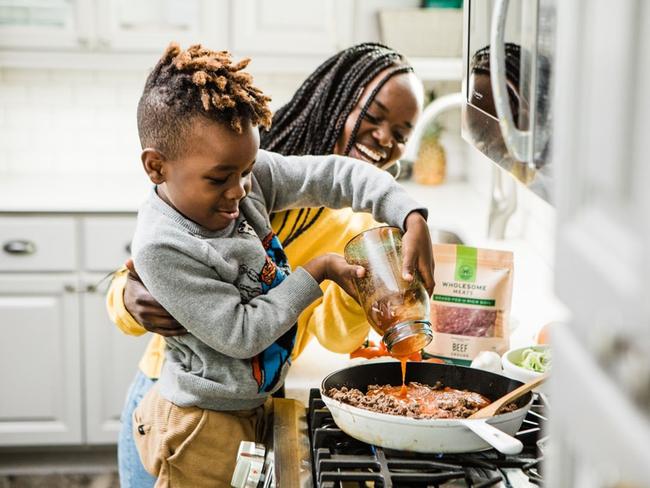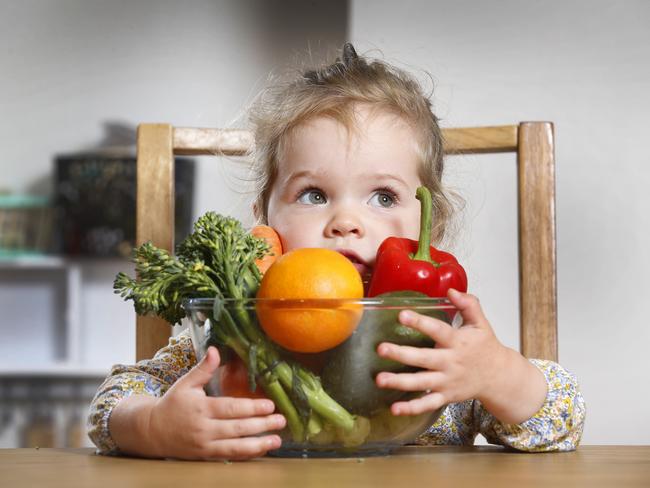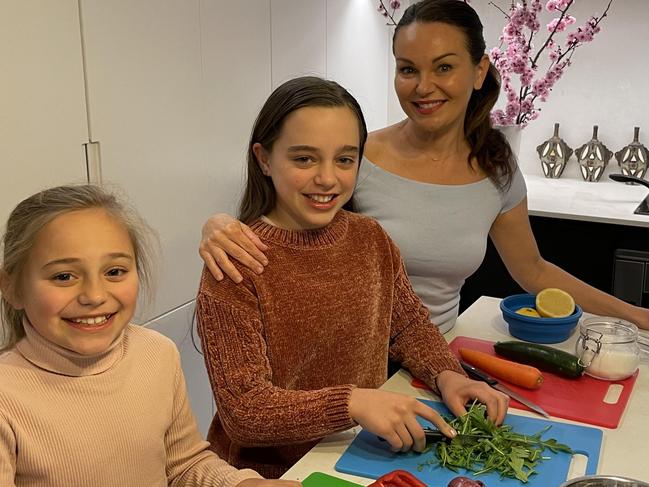How cooking can set children up to be resilient adults
Lockdown could be the perfect time for children to step up in the kitchen and develop some important life skills. Here are some tips.

SmartDaily
Don't miss out on the headlines from SmartDaily. Followed categories will be added to My News.
Getting children involved in cooking can improve their confidence and set them up with lasting life skills - and lockdown is the perfect time to start.
Almost half the respondents in the Government’s Life During Covid-19 survey reported spending more time baking and doing art and craft, with young people and those with children the most likely to embrace new lockdown hobbies.

LIFE SKILLS
The benefits of cooking run deeper than keeping children entertained. Parenting author and educator Maggie Dent believes it’s prime time for young people to step up at home, and says expecting children to help is part of raising them to be resilient, confident and competent adults.
“Society has made a big shift from punitive, tough parenting towards connected, attached parenting, but along the way, we’ve accidentally been doing too much for our kids,” she says. “We don’t want them to ever be sad or uncomfortable. It’s not realistic if we want them to one day move out. Having them help is an opportunity to raise more resilient kids.”

Delegating can initially be more time-consuming, and unleashing kids in the kitchen gets messy. However, with lockdown, Dent says it’s an ideal time to get children trained up.
“Our kids are far more capable than we expect them to be,” she says. “They can help with dinner, prepare washing, unpack the dishwasher – we can build skills.”
The satisfaction of being useful supports self-esteem, Dent adds. “When they learn new skills, whether it’s cooking scrambled eggs or doing the washing, it feeds into their self-efficacy,” she explains. “Doing things for others makes us feel good, and getting kids to help us, gives them a model to support others.”
A LOVE OF FOOD
Promoting an interest in healthy eating is another benefit. It’s also a vital one, with the Australian Health Survey finding just one per cent of children meet the recommended daily intake of vegetables.
Encouragingly, in a widespread survey of Canadian school students, researchers found that children who helped with cooking showed a preference for fruit and vegetables, as opposed to just fruit, while those involved in cooking were more knowledgeable about the importance of making healthier food choices.

“Learning to cook can help children develop a passion for food and a willingness to try new ingredients – no more fussy eaters,” adds taste.com.au food director and qualified schoolteacher Michelle Southan. “Along the way, they also pick up practical skills.”
For Dent, the nutritional benefits are a bonus but sometimes families just need to enjoy time together in the kitchen and take pleasure in “things that taste yum”.
“Food is so much more than nutrition,” she says.
“It’s about building memories, and that’s what we really need right now.
“My kids still remember racing in when the beeper went, and eating cake out of the tin when it was still warm.”
HANDS-ON LEARNING
Reading recipes, measuring ingredients, converting to the metric system and experimenting with variations are fun ways to tick literacy, science and maths boxes on the home curriculum.
Research from Stamford University has shown that students develop a deeper maths understanding when numbers are represented visually and symbolically, while another US study found food-based maths and science activities significantly increased knowledge of these subjects among primary-aged students.

Teacher and Sydney mother of two, Patricia Cencigh, has been delegating meals to daughters Charlize, 13, and Alegra, 10, during lockdown, and says it brings creativity and joy to mundane days at home. “It gets them away from their devices and eases the load on us,” she says. “Since they’re home, they’re not eating sandwiches. They’ll cook noodles or put frozen food in the oven, cut up vegies and make a salad or smoothie. When they’ve made it, they’re more likely to enjoy it.”
GET STARTED
Tips on getting children involved in the kitchen at all ages, from taste.com.au food director Michelle Southan:
PRESCHOOL CHEFS
Baking is safer for new cooks than dealing with stove tops and hot pans. Tiny tots can help to measure out, tip and mix ingredients, just make sure the bowl isn’t too full as little ones can mix with great gusto. Even spreading icing on cupcakes or vegemite inside a scroll dough are safe ways to start out. Try one-bowl cakes, puddings and biscuits where no appliances or stove top heat is required. These recipes are also great when dealing with very young children, as the end result is fast. Cupcakes and biscuits are great as many can be cooked in under 15 minutes.
EARLY PRIMARY YEARS
Once confidence starts to build, box graters and peelers are a great place to start before knives, particularly if onions and carrots are finely chopped in recipes. Using appliances can also be the next step up, from food processors for grating, to beating batters for cakes, and using dough hooks for kneading bread. However this can also be fun for kids to do by hand. Always have long hair tied back, out of the way.
EIGHT AND UP
As children get older and wiser in the kitchen, they can branch out to pancakes, omelettes and scrambled eggs. It is also invaluable to learn how to hold a knife and chop safely. Once these skills are mastered, children can try cooking classic, easy weeknight dinners like pumpkin soup, bolognese and tacos.

LIVE CLASSES
Tune in to the taste.com.au Facebook page at 4.30pm every Wednesday (AEST) for live kids’ cooking sessions with food director Michelle Southan. Each week, she’ll prepare a range of simple and tasty recipes that little hands can make, and the whole family will enjoy. Follow the recipes live, step-by-step, learn hints and tips, comment and ask questions along the way.
● August 25: Cheesy Vegemite pull-apart and nut-free chocolate crackle bliss balls.
● September 1: Mexican beef crunch wrap



